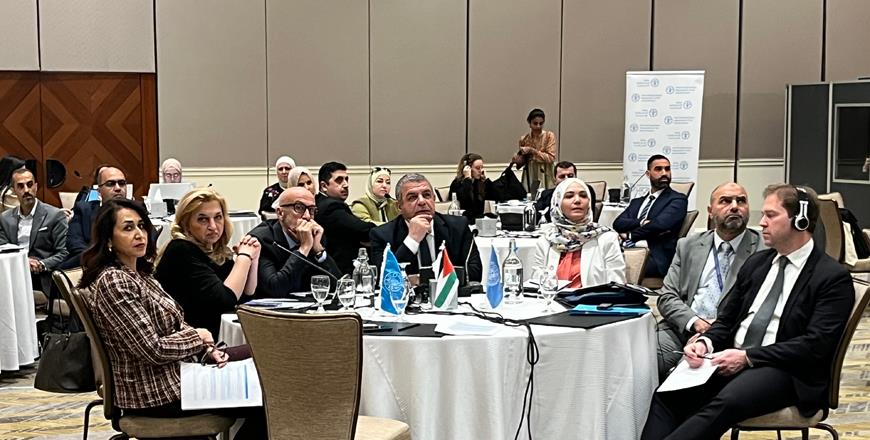
FAO Organises Workshop On Ecosystem-Based Water Solutions
The workshop, organised under the FAO project“Nature-based Solutions and Green Infrastructure to address food-water-climate Complexities in Agriculture” funded by Agriculture and Agrifood Canada (AAFC), brought together representatives involved in the agriculture sector from the
government, donors, academia and non-profit organisations.
Ecosystem-based Solutions (EbS) are approaches that utilise natural processes and components to address societal challenges while promoting sustainable and equitable utilisation of natural resources. Harnessing non-conventional water sources like treated wastewater and harvested rainwater, supports traditional water sources and reduces strain on freshwater reserves.
The Jordanian government has been investing in projects for greywater reuse in agriculture, employing economical, effective and eco-friendly systems. UN-Water recognised Jordan's efforts in advancing progress toward SDG 6 in 2024, focusing on financing, data and information, capacity development, innovation and governance, according to the statement.
During the workshop, participants discussed strategies for utilising EbS and non-conventional water sources, identified potential entry points for knowledge exchange, synergies and complementarities for scaling up initiatives. They also deliberated on future collaborations among government donors and other partners.
Raed Abu Soud, minister of water and irrigation of Jordan, stated the benefits of EbS for water management, including enhancing water availability by restoring natural ecosystems, such as wetlands and forests, which act as natural reservoirs and recharge areas, according to the statement.
Additionally, it improves water quality through natural filtration and purification processes and supports sustainable agriculture by promoting soil health and biodiversity, meanwhile increasing water efficiency by optimising ecosystem functions, and promoting sustainable water use by restoring degraded ecosystems and habitats, the statement said.
Nabil Assaf, FAO representative in Jordan, confirmed that EbS offer a pathway towards sustainable agriculture and food security.“By harnessing the power of nature, we can build resilience, conserve natural resources, and ensure the livelihoods of future generations,” he said.
Jon Marco Church, UN-Water technical expert, stated that“This year, Jordan was selected by UN-Water as one of the three countries to be recognised this year for their progress towards the achievement of SDG 6 on water. This is the result of actions taken for several decades to improve water supply, sanitation, treatment and reuse in a context of extreme water scarcity and population growth”.

Legal Disclaimer:
MENAFN provides the information “as is” without warranty of any kind. We do not accept any responsibility or liability for the accuracy, content, images, videos, licenses, completeness, legality, or reliability of the information contained in this article. If you have any complaints or copyright issues related to this article, kindly contact the provider above.
Most popular stories
Market Research

- Manuka Honey Market Report 2024, Industry Growth, Size, Share, Top Compan...
- Modular Kitchen Market 2024, Industry Growth, Share, Size, Key Players An...
- Acrylamide Production Cost Analysis Report: A Comprehensive Assessment Of...
- Fish Sauce Market 2024, Industry Trends, Growth, Demand And Analysis Repo...
- Australia Foreign Exchange Market Size, Growth, Industry Demand And Forec...
- Cold Pressed Oil Market Trends 2024, Leading Companies Share, Size And Fo...
- Pasta Sauce Market 2024, Industry Growth, Share, Size, Key Players Analys...





















Comments
No comment